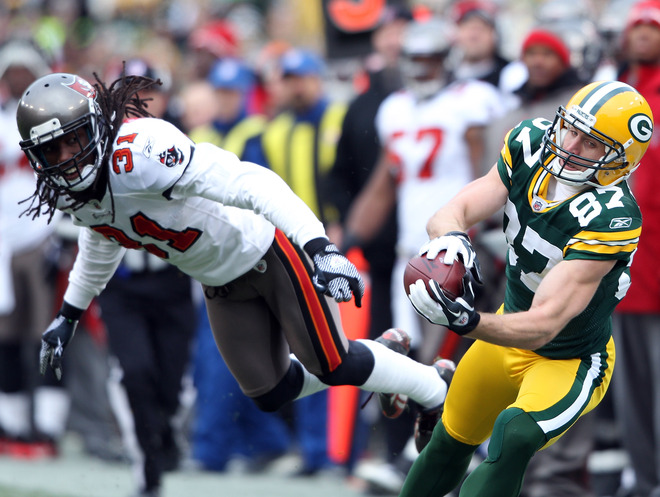|
|
 |
|
Morris took gamble, attack mode too far
| |
|---|
|
|---|
|
|---|
 Joe Henderson, The Tampa Tribune, published 21 November 2011
Joe Henderson, The Tampa Tribune, published 21 November 2011
Raheem Morris told the Buccaneers all week they were going to be aggressive against the Green Bay Packers, and throughout the afternoon on the chilly tundra of Lambeau Field he stuck with the plan. It helped put the Bucs in position to win the game.
Aggression controlled can be good, but unchecked it can sabotage. And with 4:25 to play and the Bucs trailing the unbeaten Super Bowl champs by only two points, 28-26, I thought Morris let his swagger win an argument it should have lost.
He ordered an onside kick – second one of the game, actually. Statistics have shown about 25 percent of onside kicks are successful. Those are pretty long odds for a bet that didn't need to be made at the time. "We came here to win the game," Morris said tersely.
But they did not accomplish that. Green Bay won 35-26, and it might have gone differently if the head coach had chosen to play for field position instead of going all-in on a high-risk gamble.
By now you know the Packers recovered the attempt and Aaron Rodgers' 40-yard scoring pass to Jordy Nelson a minute-and-a-half later ended the drama.
"We're not going to apologize for being aggressive," Morris said. "When you play the Green Bay Packers you've got to play aggressive. You've got to go out, make plays, and you've got to steal possessions."
At that point of the game, though, a field goal could have won it for the Bucs. There was plenty of time left to kick it deep, pin them back, and put your bets on an aggressive defense. Force a punt and you might get it back around midfield. Complete a pass or two and you have a chance to end the Packers' perfect season.
Now, this is second-guessing from the press box. On the field, the attitude was different. "I'm glad he called it," cornerback Ronde Barber said, putting the outcome back on the players. "We've got to get a stop. Whether it was on the 20 or the 50, we have to get a stop and we didn't."
If you're looking for a supporting theme in this game, there it is. In a loss like this, it's often as much about the plays that don't get made.
Kellen Winslow, for instance, caught nine passes for 132 yards. He also was flagged for offensive pass interference, wiping out a touchdown catch, and dropped a two-point conversion attempt that would have tied the game with 13:07 to play.
 They played mostly man-to-man coverage against Rodgers, especially gutsy considering the secondary was without starting safety Tanard Jackson. The Bucs were determined not to allow Rodgers to dissect a zone. Even though he finished with three touchdown passes, I thought the Bucs did as well against him as most any team could.
They played mostly man-to-man coverage against Rodgers, especially gutsy considering the secondary was without starting safety Tanard Jackson. The Bucs were determined not to allow Rodgers to dissect a zone. Even though he finished with three touchdown passes, I thought the Bucs did as well against him as most any team could.
"We weren't going to play scared, no matter how good they are," Barber said. "They put their pads on the same way we do. They've got a lot of good players, but so do we. We're in it to win, man."
But they also jumped offside three times on third down, including twice in a row on Green Bay's opening drive to aid a 15-play, 88-yard scoring march. It was part of a nine-penalty day, and you can't give the Packers that kind of extra edge.
We did see more swarming to the ball, more gang-tackling. Maybe a week of practice in pads paid off there. Freeman played with confidence reminiscent of 2010, but he also potentially cost the Bucs points with an interception near the end of the first half. He had an open running lane that could have put them in field goal position.
Maybe it's the mark of a young team still finding its way, and no one is saying losing to Green Bay is a disgrace. This loss was nothing like the abysmal display last week against Houston, but it's still the fourth setback in a row and fifth in the past six games.
If the Bucs had kicked off deep instead of gambling, maybe Rodgers drives Green Bay down the field anyway. We'll never know what might have happened. We do know what did happen.
Morris wakes up in an attack mode and he will carry that attitude through the rest of his coaching career. He will never believe he made the wrong call. The scoreboard says he did, though. The scoreboard wins every argument.
|

|
|
| |
| |
|